By some estimations, Croatia sees as many as 10,000 digital nomads every month, which doesn’t come as a surprise, considering that this Mediterranean country has quite a few advantages that appeal to the average digital nomad.
Of course, the fact that Croatia has a digital nomad visa is one of the most compelling ones. Well, we say “digital nomad visa,” but what Croatia actually introduced on January 1st, 2021 is a digital nomad residence permit.
Colloquially known as the Croatia remote work visa, this permit is different from what other European countries offer due to several reasons:
- It has fewer requirements,
- It allows applicants to apply from Croatia, and
- It has a low minimum income requirement.
But, which exact requirements do you have to meet in order to qualify for the Croatia digital nomad visa and how hard is it to actually get one? In this guide, we’ll cover:
- All the details about the Croatia digital nomad visa,
- Step-by-step instructions on how to actually get one,
- The advantages and disadvantages of visiting Croatia as a digital nomad, and
- The top destinations in Croatia for digital nomads.
So, let’s see what Croatia has to offer, shall we?
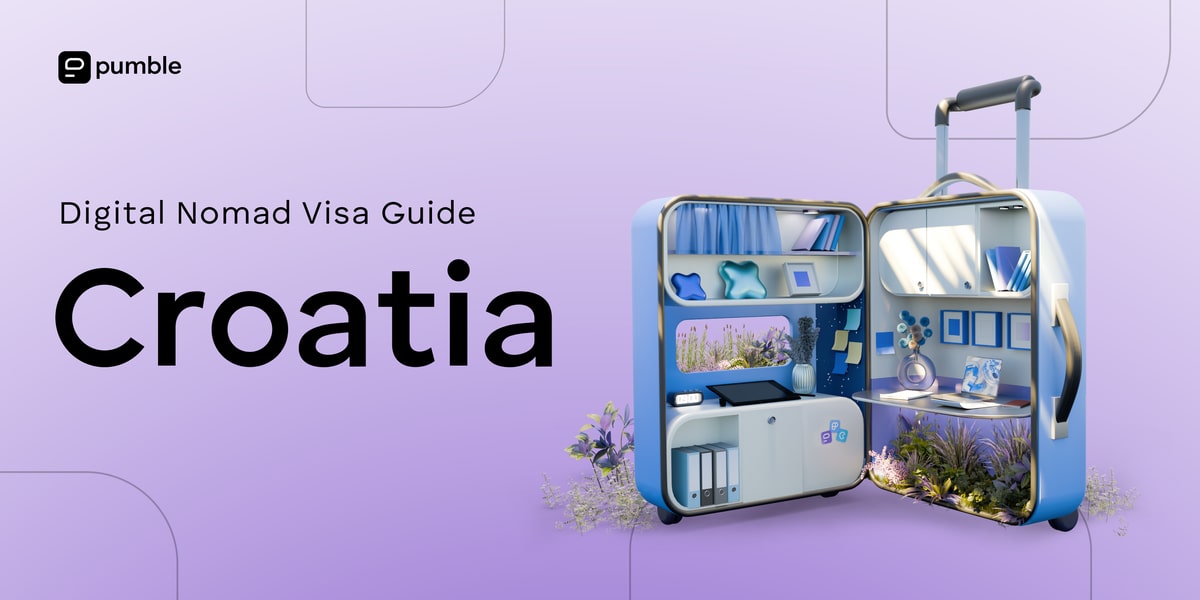
Quick digital nomad visa facts for Croatia
Here’s a quick rundown of the most important facts for Croatia’s Digital Nomad Visa.
| Croatia digital nomad visa questions | Croatia digital nomad visa answers |
|---|---|
| Does Croatia have a digital nomad visa? | Yes, the Digital nomad residence permit |
| When was Croatia’s digital nomad visa introduced? | January 1st, 2021 |
| Who can apply for Croatia’s digital nomad visa? | – Non-EU/EEA citizens who are salaried employees of a non-Croatian company. – Non-EU/EEA citizens who are freelancers working for non-Croatian clients and/or companies. – Non-EU/EEA citizens who are self-employed and providing services to non-Croatian clients. |
| How much does a Croatia digital nomad visa cost? | €97.07–€158.54 (~$110.48–$180.42) — depending on the method of payment and home country |
| Croatia’s digital nomad visa length? | 12 or 18 months, depending on the approved stay length |
| Minimum stay requirement? | None |
| Possible to extend the visa? | No, although you can apply for it again after you’ve been out of Croatia for 6 months |
| Minimum income requirements? | – €3,295 (~$3,749.94) per month, – €39,540 (~$45,010.59) for 12 months, or – €59,310 (~$67,515.88) for 18 months. |
| Processing time for visa application? | Officially 3–4 weeks but realistically between 3 and 4 months |
| Can I apply with family members for a digital nomad visa? | Yes, but the minimum income requirements increase by 10% for every family member that applies with you. |
What to expect as a digital nomad in Croatia?
Croatia has quickly climbed to the very top of the “most liked” countries for digital nomads because it has quite a bit to offer. Here’s a quick overview of what you can expect as a digital nomad in Croatia.
| Croatia digital nomad FAQ | Croatia digital nomad answers |
|---|---|
| Average Internet speed: | 55.48 Mbps — Median download speed 26.53 Mbps — Median upload speed |
| Best coworking space (highest Google rating and number of voters): | WESPA Spaces | Office, Coworking & Event Space (4.8 stars from 273 voters) in Zagreb |
| Friendly to foreigners: | Yes — a lot of the locals depend on tourism, which is why they welcome foreigners and are quite friendly and helpful to them. |
| Most popular place for digital nomads in Croatia: | Zagreb — as the capital of Croatia, Zagreb has an excellent infrastructure, which makes it the ideal spot for digital nomads. With a rich history, friendly locals, and an affordable cost of living, Zagreb is the most popular digital nomad spot. |
| Weather in Croatia’s most popular place for digital nomads: | – Average annual temperature — 22.1°C (72°F); – Coldest month average temperatures (January) — -3°C–3°C (26°F–38°F); – Hottest month average temperatures (July) — 16°C–28°C (60.8°F–82.4°F); – 1905 sunny hours annually; – 156 rainy days annually; – Occasional urban floods and storms. |
| Type of climate: | – Mediterranean climate – Continental climate |
| Annual air quality average: | US AQI — 69 (moderate quality, some health hazards) PM2.5 — 3.8x the WHO annual air quality guideline value (unhealthy for sensitive groups) |
| Average cost of living: | – Single person: €732.3 (~$833.61) per month – Family of 4: €2,536.3 (~$2,887.17) per month |
| Average coworking space cost: | €189—€229 (~$215.15—$260.68) per month per person |
| Crime index: | 21.25/100 (considered low) |
| Interesting fact for digital nomads: | – Zadar has a digital nomad village – Croatia has a Digital Nomad Association |
What digital nomad visas does Croatia offer?
Croatia was the second EU country to take the leap and introduce a visa strictly for digital nomads.
After the pioneer move Estonia made in 2020 in order to attract more visitors in the midst of the pandemic, Croatia, a country that relies heavily on tourism income, was quick to jump on this bandwagon.
That’s how the idea for the Croatia digital nomad visa was born. It eventually ended up being refined so, today, we have the digital nomad residence permit at our disposal.
Aside from this permit, Croatia also offers 2 other visa options that might suit the needs of digital nomads (but aren’t strictly digital nomad-related):
- Type C short-term visa and
- Type D long-term visa.
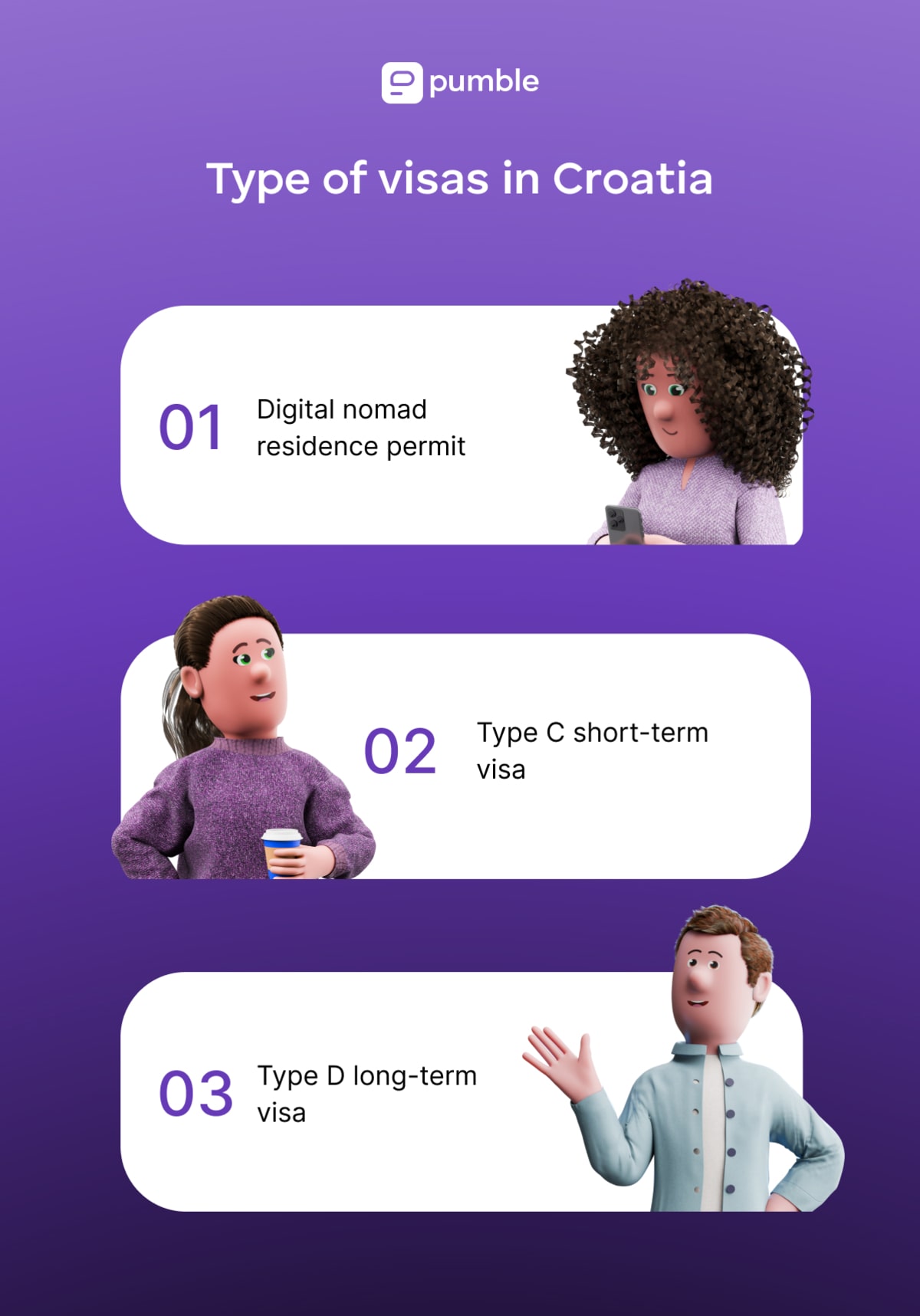
Although a part of the EU since 2013, Croatia still has quite a low cost of living compared to other EU countries. That makes it a perfect choice for everyone who wants to enjoy the perks of the Union without paying a small fortune for it and also explains (in part) why digital nomads love it.
So, let’s see which requirements a digital nomad has to meet in order to obtain a Croatian visa.
Croatia digital nomad residence permit
Developed with input from digital nomads, the Croatia digital nomad residence permit allows digital nomads to live and work in Croatia for up to a year.
Of course, it does have a couple of stipulations and requirements.
Firstly, the permit that Croatia offers is only available to digital nomads.
According to the Republic of Croatia Ministry of the Interior, a digital nomad is:
“A third-country national (this means a non-EU/EEA/Swiss citizen) who is employed or performs work through communication technology for a company or his own company that is not registered in the Republic of Croatia and does not perform work or provide services to employers in the Republic of Croatia.”
To translate this into regular people talk, the Croatia digital nomad visa requirements are:
- You need to be a citizen of a country that isn’t a part of EU/EEA (or Switzerland),
- You need to be able to work remotely (by using communications technology like the Internet), and
- You need to work for a company or own a company that isn’t registered in Croatia.
Aside from that, you’ll also need proof of:
- Travel insurance that covers the duration of your stay in Croatia,
- Substantial finances, which give the government insight into your earnings for the past 6 months and prove that you earn at least €3,295 (~$3,749.94) per month or, alternatively, that you already have at least €39,540 (~$45,010.59) in your bank account if you’re staying for 12 months or €59,310 (~$67,515.88) if you’re staying for 18 months,
- A clean criminal record, and
- A residence address in Croatia.
Although quite straightforward at first glance, in practice, the process of getting the Croatia digital nomad visa residence permit can be somewhat convoluted. Digital nomads who want to apply are often left with a lot of questions that seemingly don’t have answers.
Well, fret not, because we have them and we’ll provide some of them below.
How long is the Croatia digital nomad visa valid for?
Once approved, the Croatia digital nomad visa (or a residence permit) allows you to stay and work in Croatia for up to 1 year.
After that year is up, you can’t just renew your visa.
Instead, the Croatian law demands that you leave Croatia for at least 6 months. There has to be at least 6 months between the day your permit expires and the day you apply for a new one. So only after those 6 months are up can you try to get a new permit.
But do you really have to leave Croatia the day your residence permit expires?
That depends.
If your permit expires and you still haven’t used up your allotted 90 days that you can spend in the Schengen area visa-free, then you can stay in Croatia for those additional 90 days.
However, after that, you’ll have to leave not only Croatia but the entire Schengen Area, since one can’t stay in the Schengen Area for more than 90 days in a 180-day period.
A digital nomad who was a permit holder and spent some time in 2023 in Split, Croatia, Natalia Ivanikova, cites this as one of the few issues that the Croatia digital nomad visa has.
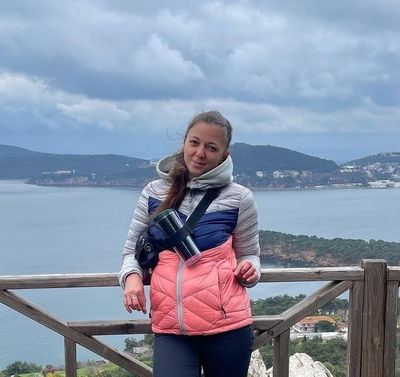
“The fact that we can’t renew the visa is probably one of the biggest drawbacks of the Croatia digital nomad permit. It’s only valid for 1 year. Aside from that, the visa restricts you from traveling abroad — you can’t be outside of Croatia for more than 90 days in total during the year your visa is valid for and yor trips abroad can’t be longer than 30 days. On the other hand, Croatia joined the Schengen Area and eliminated sea and land border control points, making traveling around the EU easier.”
Can the Croatia digital nomad visa be used to gain citizenship or a permanent residence?
The fact that you can’t renew your Croatian digital nomad visa immediately might seem like a downside to most people. But, this visa was never created to be a long-term visa for people on a path to Croatian citizenship.
According to the Croatian Law on Foreigners, to qualify for permanent residence that will eventually allow you to get citizenship, you must:
- Spend 5 continuous years in Croatia, and
- Spend no more than 10 months outside of Croatia during those 5 years.
The stipulations of the digital nomad visa (which demand you leave Croatia for 6 months after your residency permit expires) clearly block any attempts for permanent residence.
But, that’s not necessarily a bad thing because it’s, in part, what allowed the rest of the requirements to be somewhat straightforward. By removing the possibility of extension, the government essentially removed several layers of bureaucracy.
This is an excellent thing because, as you’ll probably find, dealing with the Croatian bureaucracy is a daunting task.
We spoke to Andrea Woods, a Canadian digital nomad who first visited Croatia on a tourist visa in 2020. Since then, she’s had 2 digital nomad residency permits granted by the Croatian government. But, as she says, it hasn’t been easy.

“Dealing with the Croatian bureaucracy can sometimes be frustrating. We’ve stayed in Dubrovnik both times, but we’ve had to visit several different police stations to get all of our papers in order. It seems as though each police station has different requirements for foreigners who are trying to register an address or apply for the digital nomad residency permit. There’s very little consistency when it comes to what you actually have to do and, even though there are specific requirements for the visa, you might have to deal with different demands depending on where you’re staying.”
What documents do I need for the digital nomad residence permit?
There are 3 different ways you can apply for the Croatia digital nomad visa:
- Online, from abroad or from Croatia if you don’t need an entry visa,
- By submitting an application in a Croatian consulate or embassy if you do need an entry visa, and
- By visiting a local police station in Croatia.
This is actually one of the major advantages of the Croatian digital nomad visa. Ivanikova chimed in on that topic.

“I’ve never been to Croatia prior to applying for the digital nomad visa, and I didn’t know much about it. The fact that I could apply online and wait for the visa to get approved from within Croatia made me decide on it as my next destination. As far as I know, Croatia is the only European country where that’s possible. Plus, when compared to some other countries, the list of required documents is much shorter as well as understandable and convenient.”
So, the option to apply online is a big hit among digital nomads.
But, no matter which option you choose, you’re going to need the same, specific set of documents. But don’t worry — as Natalia said, there aren’t that many of them.
One of the most important things to remember is that if you’re applying online, all of your documents need to be submitted in PDF form. If they aren’t, they’ll most likely be rejected and you’ll be forced to repeat your application (or, at the very least, resend the documents).
Documents to include in your application
Your Croatia digital nomad visa application should include the following:
- A completed application form,
- A copy of your passport or another valid travel document, which must be valid for at least 3 months after your stay in Croatia is finished,
- Proof of travel or private health insurance (from a company that covers the territory of the Republic of Croatia),
- Proof of purpose — a contract or another official document that proves that you are able to conduct your work for a non-Croatian company (yours or owned by a third party) by using communication technology,
- Proof of means of subsistence — proof that you either earn more than €3,295 (~$3,749.94) per month or that you have more than €34,440 (~$38,095.98) in your bank account for a 12 month stay, or €59,310 (~$67,515.88) for an 18 month stay,
- Proof that you haven’t been convinced of any criminal offenses in your home country or in a country in which you have been living for a year or more prior to arriving in Croatia, and
- Proof of accommodation.
What to include as proof of purpose for the Croatia digital nomad visa
Proof of purpose demonstrates to the Croatian government that you:
- Are a digital nomad who is able to conduct work through communication technology,
- Work for an employer or employers who aren’t registered as a company in Croatia, or
- Own a company which isn’t registered in Croatia.
As proof of purpose, you can submit one of the following documents:
- A signed, official statement from your foreign employer that proves that you have the permission to work remotely (by using communication technology),
- A contract of employment or service with an employer who isn’t registered in Croatia (so, a foreign employer), or
- A copy of the registration of your own company, if you’re providing services for clients through your own company. The company you own can’t be registered in Croatia.
It’s always better to have more documents than you need than fewer. That’s why you can also submit any company registration documents, the tax number of your company, contracts you have with clients, etc. — anything that proves that you won’t do business in Croatia.
What to include in the proof of means of subsistence for the Croatia digital nomad visa
Means of subsistence is just proof that you earn or have enough money to support yourself during your stay in Croatia.
In other words, you need to prove that you’re earning more than the required monthly minimum €3,295 (~$3,749.94).
However, since the visa is issued for up to a year, the Croatian government allows digital nomads to also prove means of subsistence on a yearly basis.
If you have more than €39,540 (~$45,010.59) in your account at the moment of submitting the application (which is enough money to support yourself for a 12 months in Croatia), the Croatian government will find you suitable for the digital nomad visa.
As proof of means of subsistence, you can provide one of the following:
- A bank statement showing that you have enough money in your account for the full year,
- A bank statement proving that your regular monthly income exceeds the required monthly minimum, or
- Payslips for the previous 6 months that prove that your regular monthly income exceeds the required monthly minimum.
If you plan to stay for 18 months, the required amount is €59,310 (~$67,515.88).
What to include as proof of a clean criminal record for the Croatia digital nomad visa?
To prove you have a clean criminal record, you have to go through a background check. You must provide legalized documents from your home country or the country in which you were a resident for at least a year prior to arriving in Croatia.
These documents have to be authenticated in accordance with the regulations of the country of their origin.
If you’re from the US, you’ll need to get a federal background check from the FBI (not one from the state you’re originally from).
US citizens can receive their background check in one of 2 ways:
- Electronically via email — by submitting a form online, getting their fingerprints taken in any post office in the US, and receiving their background check via email, or
- Via First-Class Mail (US Postal Service) — by filling an online application, submitting fingerprints online, and receiving their background check via physical mail.
Keep in mind that the validity of the FBI background check expires after 6 months, so time it right when applying for the digital nomad visa.
How to deal with potential background check issues
The law regarding this particular requirement isn’t exactly clear. What’s more, the interpretation of the law can also change from police station to police station.
Therefore, you might get various information regarding which documents you actually have to submit depending on where you go to apply.
Woods gave us some additional input regarding these difficulties.

“If you’re not applying from your home country, it can be quite difficult to get the visa. Getting the background check from overseas is the most laborious part of the process. What’s more, it can oftentimes be completely nonsensical. I haven’t been in Canada for the past 5 years, and yet they still needed me to provide a background check.”
Woods continued by saying that, aside from being a bit unnecessary in some cases, the criminal background check is also a lengthy process.

“During my second application, I had to go to the police department in Dubrovnik to have my fingerprints taken and mail them to a special company in my home country (Canada). That company digitized the prints and sent them to the Royal Canadian Mounted Police so they could check them and send them to the Canadian Ministry of Foreign Affairs, who then sent them to the embassy of Croatia in Canada who finally emailed the documents back to me in Croatia.”
That’s quite a runaround.
So, if you’re planning on applying for the visa from any other country than your own, be prepared to jump through some hoops.
Do I need to book or rent a place in Croatia as part of the visa application?
Yes, as proof of accommodation is one of the necessary documents that you’ll need to apply for the visa.
For proof of accommodation, you need to provide the authorities with a valid Croatian address. The address can be:
- Permanent, in which case, you’ll need to provide proof of booking or a rental agreement, or
- Temporary, in which case they’ll need proof of booking from your hostel or hotel.
The address is a necessity because, based on your address, you’ll be assigned to a local police station that has jurisdiction of the area. They will be in charge of processing your application on a local level.
If you opt to apply with a temporary address (like a hostel or a hotel booking), know that you’ll have to get a permanent address once your residence application gets approved. You’ll need to supply the authorities with a notarized contract that proves you have a permanent place to stay for the duration of your visa.
Keep in mind that booking a place might be more difficult than you’re used to. Ivanikova warns about potential issues with accommodation.

“Getting an apartment in Croatia might be a challenge for those who arrive during high season. The season here starts on the 1st of May and lasts until the end of September. Within this period, the price of literally every flat and hotel room on the coast multiplies by 4. If you arrive outside the tourist season, you won’t have trouble finding a place, but you won’t be able to book it for a full year. 90% of flats are only available from the end of September to the end of April or the middle of May.”
Do I need a Croatian bank account for the digital nomad visa?
A Croatian bank account isn’t a necessity for the visa. You can open one, but all the authorities really need from you are documents that prove you have enough money to sustain yourself in Croatia for the duration of your stay.
Can I apply for the digital nomad visa if I’m already in Croatia?
Yes, there is an option to apply while you’re in Croatia.
Quite a few digital nomads opt to go this route and arrive in Croatia as tourists or on a type-D visa (of which we’ll talk more later on) only to apply for the digital nomad residence permit later on.
However, keep in mind that this could potentially be risky. The wait time for the visa is quite long (even though the official website states the wait is only 3–4 weeks) and can last for up to 4 months (sometimes even longer).
That might mean you won’t have enough time to gather all the necessary documents, submit them online or in the police station that has jurisdiction of your area, and wait for the visa to get approved.
Can freelancing digital nomads with short-term contracts apply for the digital nomad visa?
Yes, you can apply for a Croatia digital nomad visa even if you’re a freelancer. However, you will need to provide the authorities with:
- Contracts you have with your clients that prove you’re working remotely,
- Proof that all of your employers/clients are not Croatian nationals (and that their companies aren’t registered in Croatia),
- Proof that your company isn’t registered in Croatia, and
- Proof that you meet the minimum income requirements (on a monthly or a yearly basis).
Stay on top of your freelance work with Pumble
Can my family apply for the digital nomad visa with me if I’m the breadwinner?
Under the family reunification rules of Croatian law, your immediate family members can join you in Croatia. They don’t have to apply for the digital nomad visa separately, as you can include their documents along with your application.
For each family member that you apply with, your minimum income requirement will increase by 10%.
Under the Croatian law, immediate family members are:
- Spouses,
- Common law partners, and
- Minor children.
If you apply along with your family members, aside from the standard documents that are required, your application must also include:
- A marriage certificate for your spouse,
- An extract from the birth register or proof of adoption for each minor child, and
- Proof of a civil union (if applicable).
Keep in mind that Croatia has some specific requirements regarding what can and can’t be classified as a “common-law partner.”
How can I apply with my common-law partner?
To be able to apply with your common-law partner, you must be with them for at least 3 years (shorter if you have a child together, in which case, you’ll have to provide that child’s birth certificate, even if you aren’t including the child on the application).
Furthermore, your common-law partner can only come to Croatia with you if you can provide:
- An extract from the register of common-law partnerships,
- A statement by both you and your partner regarding your shared life together,
- Statements from witnesses who can confirm that you’re actually partners and that you’ve been together for at least 3 years,
- Proof that you’ve been living together in Croatia or any other country for at least 3 years prior to applying for the visa, or
- Any other proof that you’re in a common-law partnership and that you’ll continue to live together once you arrive in Croatia.
Of course, you don’t actually need to provide all of these documents. If you’re in a registered common-law partnership, then all you really have to do is prove that, just like you’d prove a marriage with a marriage certificate.
However, it’s important to keep in mind that all these documents need to be valid according to the Croatian standards. Here’s what Woods had to say about that.

“Each police station might have different standards for documents and their validity when you’re applying. For example, when I applied for the second digital nomad residence permit, they told me my marriage certificate is more than 6 months old and I need to get a new one. They haven’t had any complaints about how old my marriage certificate was the first time around, so there seems to be no consistency across the country when it comes to this particular issue.”
Who is eligible to apply for Croatia’s digital nomad visa?
Like other countries in the EU, Croatia aimed this digital nomad residence permit at non-EU/EEA/Swiss citizens. Citizens of these areas and countries don’t have to apply for the digital nomad visa, since they already have the right to live and work in Croatia.
However, citizens of the EU/EEA/Switzerland can apply for residency in Croatia. There are two different types of residency available to them:
- Short-term residency — that regulates their stay for up to 90 days, and
- Temporary residency — that regulates their stay for more than 90 days.
Digital nomads from other countries need to apply for the digital nomad visa.
Are you eligible if you are a United States citizen?
Yes, US citizens can apply for the Digital Nomad Visa. Just like the members of the EU/EEA/Switzerland, citizens of the US can enter Croatia without a visa no matter what their purpose of travel is and spend up to 90 days there.
In fact, almost all North American, South American, and European citizens (except citizens of Russia and Türkiye) are allowed to enter Croatia and stay for up to 90 days.
On the other hand, citizens of many Asian countries cannot enter the county without a visa.
Check out this handy Visa exemption map for Croatia to see whether or not your country requires an entry visa for Croatia.
Are you eligible if you are a US Green Card holder?
All citizens of non-EU/EEA countries can apply for the Croatia digital nomad visa. The only question is whether you can do it from within Croatia or not.
Unfortunately, having a US Green Card doesn’t automatically mean that you can enter Croatia without a visa.
For example, if you’re a US Green Card holder but originally a citizen of one of the following states, you might not be able to entire Croatia without a visa:
- China,
- Ghana,
- India,
- Lebanon,
- Morocco,
- Philippines,
- South Africa, or
- Thailand.
So, while you are eligible to apply for the digital nomad visa no matter which country you’re from (as long as you meet the requirements), you might only be able to do it online or in a Croatian consulate or embassy in your home country.
Are you eligible if you are an EU citizen?
EU citizens don’t have to apply for the Digital Nomad Visa. Instead, they can live and work in Croatia for up to 90 days (with a short-term residency permit) or for longer than 90 days (with a temporary residency permit).
Are you eligible if you reside in any other country?
As mentioned, all third-country nationals can apply for a digital nomad visa in Croatia. However, some might not be able to enter Croatia and apply from within the country without first obtaining a D-type visa (short-term stay visa or a temporary stay visa).
There are a few exceptions though.
For example, if you’re a third-country national that holds certain valid documents that were issued to you by a Schengen member state, then you won’t need a D-type visa for Croatia. These documents are usually either residency permits or C-type visas issued by a Schengen member state.
Furthermore, if you are a third-country national that holds a Bulgarian, Romanian, or Cypriot visa, you won’t need a Croatian visa for a stay shorter than 90 days.
How do I get a digital nomad visa for Croatia?
Obtaining a Croatia digital nomad residence permit isn’t easy. As Woods already testified, it can be a difficult and arduous process.
To make things easier for you, we’ve made this 7-step guide on what you should do.
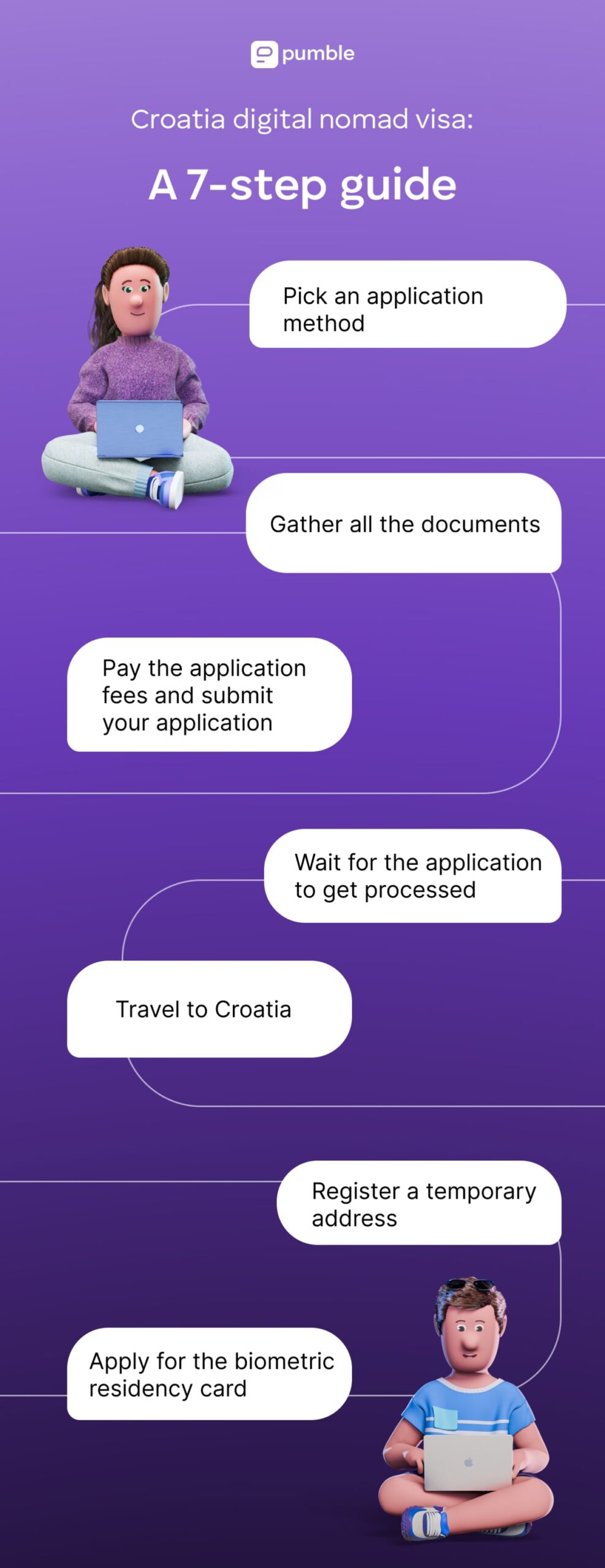
Step #1: Pick an application method
Before doing anything, you need to pick your method of application. If you don’t need a visa to enter Croatia, you can apply:
- Online,
- In a Croatian consulate or embassy in your home country, or
- Directly in Croatia.
If, however, you do need a visa to enter Croatia, you must apply either in a consulate or embassy or online.
If you’re applying in a consulate or embassy, make sure to call them and check on the current requirements. As mentioned, rules and minute requirements can change from consulate to consulate, so make sure you know what yours will demand from you.
Step #2: Gather all the documents
Gathering the necessary documents will take time. If you’re already in Croatia and are applying for the Digital Nomad Visa during your 90-day visa-free stay, keep in mind that some documents might take longer than others to arrive.
The FBI criminal background check, for example, takes a few weeks or even more than a month to arrive via mail to you.
Step #3: Pay the application fees and submit your application
After you’ve ensured that you have all the documents (translated and notarized), you can submit your application online or in person.
If you’re doing it online, remember that all your documents must be in PDF form.
Those who apply in person should remember to make extra copies of their documents beforehand.
The application fees differ depending on the method you’ve chosen.
If you’ve applied through a consulate or embassy or online, you’ll have to pay:
- €55.74 (~$63.45) for the temporary stay permit,
- €93 (~$105.87) for a D-type visa (if you need it), and
- €41.14 (~$46.83) for the biometric residence card.
If you’ve applied directly at a police station, you’ll have to pay:
- €46.45 (~$52.88) for the temporary stay permit,
- €31.85 (~$36.25) for the biometric card, and
- €9.29 (~$10.57) for the administrative fees.
Step #4: Wait for the application to get processed
The Croatian government states that the waiting period typically doesn’t last more than 3–4 weeks. In extreme cases, it can take up to 12 weeks.
However, Ivanikova says that the visas rarely get processed that quickly.

“No one I know got the visa in less than 3 months. It doesn’t matter where people applied — in one of the coastal cities or in Zagreb — they all waited for 3 or more months. In my case, I applied online on the 24th of July and arrived in Split on the 13th of August. I received the approval on the 10th of November, but got the physical residency card on the 25th of November.”
That’s quite the wait.
However, waiting to get your visa processed and approved doesn’t have to be that big of an issue, as Ivanikova noted:

“If you apply for the digital nomad residency permit in person in Croatia or come as a tourist after you’ve applied online to wait for the visa to get approved, you can go to the nearest MUP (the police office) and ask them for an official paper stating that your visa documents are under review. With that paper, you can legally stay in Croatia even if your tourist visa or whatever visa you used to get in Croatia expires. However, that paper doesn’t allow you to travel outside Croatia.”
So while you can wait for the visa to be approved from within Croatia, you can’t really use that time to backpack across Europe, it seems.
If you’ve applied online or in a consulate, you’ll receive an email when your application gets processed. If you’ve applied in person, you’ll most likely get a call or an SMS to the Croatian number you provided during the application.
Your chances of getting the Croatia digital nomad visa are fairly decent. In 2023, the Croatian government received 1485 applications and approved 532 of those, while another 83 are on pause (probably due to insufficient documentation).
Step #5: Travel to Croatia
Once you get the green light, if you’re not following Ivanikova’s footsteps and patiently waiting for your visa from within Croatia, you can finally travel there.
You have to arrive in Croatia within 30 days of the application approval. If you don’t need a visa to enter Croatia, you can simply go and enter the country without an issue.
If, however, you do need a visa, you will need to apply for a D-type visa that allows you to enter Croatia multiple times over a period of 6 months.
It’s actually smart to apply for this visa at the same time as for the digital nomad residency permit, so you don’t have to wait for 2 visas. That way, you will be able to head down to Croatia immediately after your D-type visa is approved and wait for your digital nomad residency permit there.
Step#6: Register a temporary address
Once you arrive in Croatia, you’ll have 3 days to register a temporary address. To do that, you’ll have to go to the nearest police station (MUP). There, you will:
- Fill out Form 8a (called Obrazac 8a in Croatian), and
- Present proof of accommodation (a rental agreement or a booking confirmation).
If you only have a temporary address (as in, a short hotel or hostel booking), don’t worry. You can always change the address later by doing the same process again at the nearest police station.
Step #7: Apply for the biometric residence card
Finally, the last step of the process is to apply for the Biometric Residence Permit. This permit (or a card) is necessary for all digital nomads who intend to stay in Croatia longer than 3 months.
The issuing of this card costs €31.85 (~$36.25) or €59.73 ($67.99) if you want the process to be done quickly (the accelerated procedure). Aside from that, you also need to pay a €9.29 (~$10.57) administrative fee.
Can I live in Croatia without a digital nomad visa while working remotely?
You can work and live in Croatia if you’re a citizen of:
- EU,
- Switzerland,
- Norway,
- Iceland,
- Liechtenstein, or
- Principality of Andorra.
However, you do need to get a residence permit in order to do so.
Third-country nationals need to obtain a visa (a work visa or a digital nomad residence permit) in order to live and work in Croatia.
What other types of visas suitable for digital nomads does Croatia offer?
If you can’t obtain a digital nomad residence permit in Croatia, there are a few other options you can explore.
Sadly, neither of them can provide what the actual digital nomad visa is offering — a legal way to work and live in Croatia for up to a year.
However, if you’re interested in a shorter stay, you can try for one of these two visas:
- Type-C short-term visa, or
- Type-D temporary visa.
The first is a typical Schengen area visa while the other is a national Croatian visa.
Type #1: Type C short-term visa
The short-term visa is valid for 90 days during a period of 180 days.
It’s valid for all countries that are members of the Schengen Area, so if you’re planning on visiting multiple Schengen Area members, you need to be careful not to run out of time on your visa.
If you’re not sure how many days you’ve already spent in the Schengen Area (and how many you got left), you can check out the short-stay visa calculator.
Type #2: Type D long-term visa
Type D visa is a national Croatian visa that’s usually granted to people who have applied for other visas (such as the work visa or the digital nomad visa). It allows them to enter Croatia one or more times for a period of up to 30 days.
It’s usually used by people who want to sort out their paperwork (like registering an address and getting a biometric card) before they get the actual visa they originally applied for.
Which Croatia visa type is best for digital nomads?
Since it was made specifically for digital nomads (and with input from digital nomads), the digital nomad residency permit is the best choice for anyone looking to work and live in Croatia for more than 3 months.
Aside from being tailor-made, this residency permit also doesn’t cut into the time that you’re allowed to spend in the Schengen Area. What’s more, it actually prolongs it, given that the Croatia digital nomad visa holders can enjoy all the privileges of EU nationals for the duration of their visa.
Costs you need to consider as a digital nomad in Croatia
As a member of the EU with lower than average GDP compared to its other members, Croatia serves as an affordable gateway into Europe for digital nomads.
It’s conveniently located and cheap compared to some other countries. For instance, Germany has a 26% higher cost of living than Croatia does. Similarly, in France, the cost of living is 24% higher than in Croatia. That makes Croatia a perfect choice for digital nomads who want to travel on a budget.
Still, living in another country — even one that’s so much cheaper than the rest of the Western Europe — comes at a cost.
Let’s take a look at some expenses that digital nomads can expect in Croatia.
Expense #1: Rent/Accommodation
Accommodation is the biggest expense any digital nomad has. Unless you’re touring Croatia by couch surfing, you’ll need to rent out at least a room.
Depending on where you want to be and which month of the year you pick to visit Croatia, the accommodation costs will vary drastically. For example, your rent expense won’t be as high in Osijek as it will be on the coast.
Most digital nomads opt for coastal towns or, alternatively, the capital, Zagreb. These spots are typically more expensive than smaller, rural towns.
Take a look at how prices vary in different Croatian cities.
| City | Average cost of rent for a 1-bedroom apartment in the city center (per month) |
|---|---|
| Zagreb | €600–€800 (~$682.99–$910.65) |
| Dubrovnik | €530–€862 (~$603.33–$981.27) |
| Osijek | €350–€500 (~$398.43–$569.19) |
| Zadar | €400–€700 (~$455.35–$796.87) |
| Rovinj | €500–€1,000 (~$569.19–$1,138.39) |
| Split | €500–€1,000 (~$569.19–$1,138.39) |
Keep in mind that these prices might be completely different during high season, especially in coastal towns.
During spring and summer, most property owners opt to rent out their houses and apartments on a nightly basis to cater to tourists (and earn more money). During those months the prices go up and the availability goes down.
Our expert Andrea Wood adds:

“My husband and I opted to stay in Dubrovnik this time again, because we fell in love with it. We’ve been here the previous time as well, and it feels almost like home — we even adopted a rescue dog here. However, we will have to leave during the summer this year because of the cost of living in Dubrovnik. The prices are quite high during the summer. That wasn’t an issue last time due to Covid, but this time we simply can’t keep up with the rising costs.”
Although most extreme in cities like Dubrovnik, the rise of prices that happens as soon as summer rolls around is evident everywhere. Woods commented:

“We managed to find a great rental deal through an acquaintance in Cavtat. If we didn’t have that connection, we’d have probably given up and not proceeded with the second application due to the cost of accommodation in summer all over the country.”
Expense #2: Utilities
On average, you’ll pay between €140 and €170 (~$159.39–$193.54) for utilities every month. That includes:
- Electricity,
- Heating,
- Cooling,
- Gas,
- Water, and
- Garbage.
Utilities are sometimes bundled with rent. That’s something you definitely need to pay attention to as it can affect the overall price you pay for a rental.
Aside from the basic amenities, your utilities can sometimes include cable and internet. The cost of a flat, unlimited internet and cable combo package is between €30 and €40 (~$34.15–$45.54).
Expense #3: Transportation
Out of all the expenses, transportation will be the most affordable one.
Croatia has quite well-developed infrastructure, and the towns (especially those on the coast) are well-connected with bus and ferry routes.
With over 1700 km of coastline, more than a 1000 islands, and several dozens of towns inland, having such an extensive public transportation network is quite a feat.
Big cities like Zagreb and Zadar have excellent public transportation services. On average, a daily card costs around €0.53 (~$0.6) for a 30-minute ride and €3.98 (~$4.53) for an all-day pass.
| City in Croatia | Single fare ticket | Multi day ticket | Monthly pass |
|---|---|---|---|
| Zagreb | €0.53–€3.98 (~$0.59–$4.41) | €3.98–€26.54 (~$4.41–$29.44) | €53.09 (~$58.89) |
| Zadar | €0.53–€3.98 (~$0.59–$4.41) | / | €39.82 (~$45.32) |
| Osijek | €1.46 (~$1.62) | / | €36.50 (~$41.54) |
Expense #4: Groceries
Although it may seem unbelievable, Croatians spend only around 25% of their income on rent (during low season). In comparison, around 28.5% of their income is spent on groceries.
Considering how high rent is in some places (we’re looking at you, Dubrovnik), this might seem like a surprising number to some.
However, take into account that big tourist hubs like Dubrovnik don’t see a lot of native renters. Natives aren’t really keen to spend half of their earnings on rent, but they are more than happy to spend money on food.
Take a look at the average distribution of expenses of a typical Croatian.
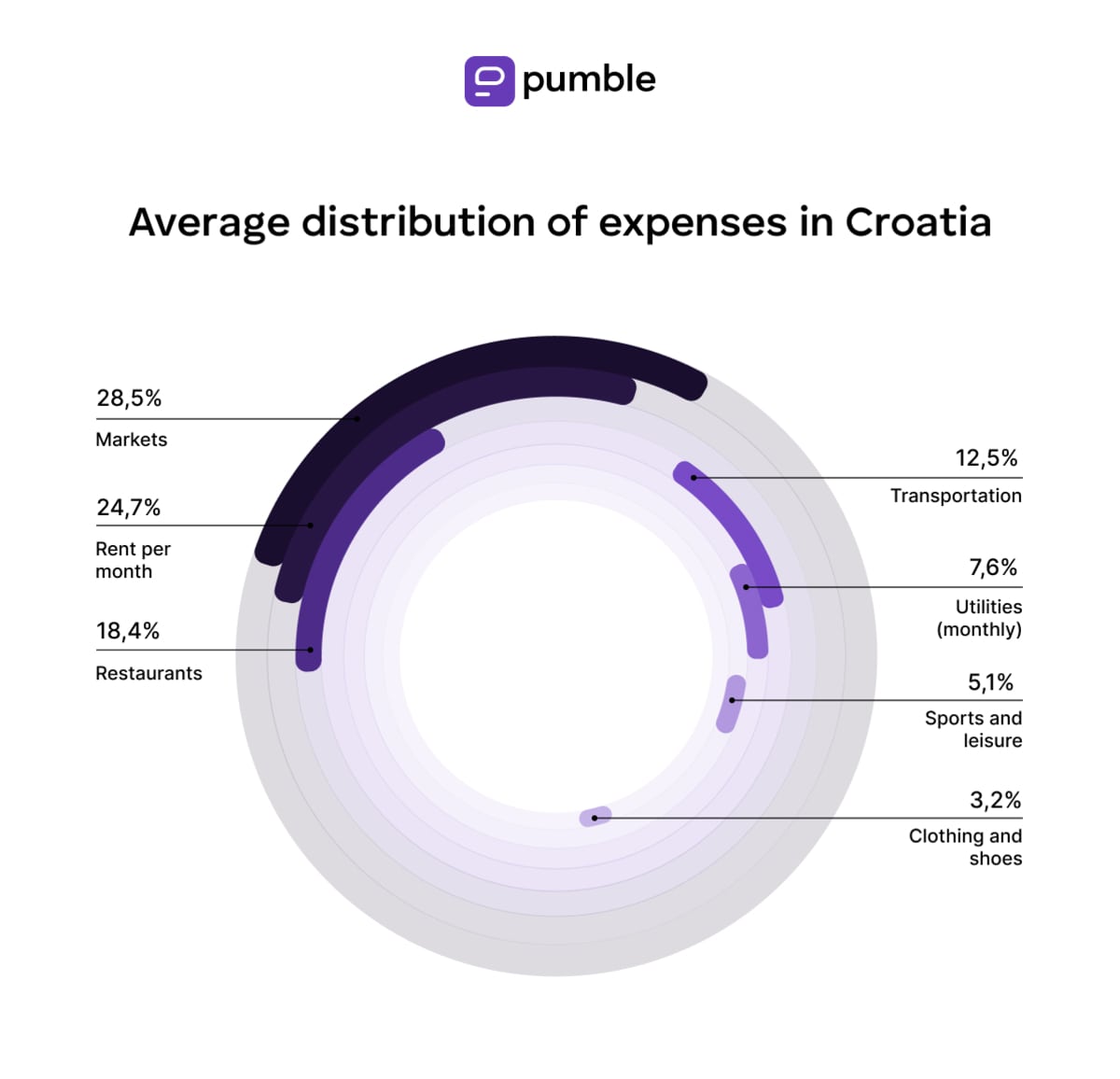
Prices of food in Croatia vary depending on where you’re shopping. Local markets that offer fresh produce from local distributors are often the cheapest (and, coincidentally, the healthiest).
But, overall, the prices of food in Croatia look something like this:
| Food | Average prices |
|---|---|
| 1 l (33.81 fl oz) of milk | €1.10 (~$1.25) |
| 1 loaf of bread | €1.31 (~$1.49) |
| 1 kg (2.2 lbs) of chicken filets | €8.54 (~$9.72) |
| 1 kg (2.2 lbs) of red meat | €10.21 (~$11.62) |
Expense #5: Restaurants, cafes, and bakeries
Croatia is famous for its food. Although the same can be said for a lot of countries, Croatia has easy but exciting cuisine that’s both distinctive and typically Mediterranean.
Not everyone will like everything Croatia has to offer, but the people have come to appreciate and even celebrate that.
Of course, the prices of Croatian dishes vary depending on where and what you’re eating.
A meal for 2 in a typical, mid-range restaurant will be around €40 (~$45.52) while a soiree in a high-end restaurant won’t cost under €100 (~$113.81).
But not everything is that pricey.
A cappuccino in a coffee shop will cost you €1.99 (~$2.26), while you’ll be able to get a bottle of Coca-Cola or Pepsi for around €2.54 (~$2.89).
If you like to party, you’ll be happy to hear the prices of drinks in bars and clubs are more than decent. A mid-range bottle of wine is just over €6 (~$6.83) while imported beer is around €3.06 (~$3.48).
Expense #6: Internet
The most important item on this list (and one where we spare no expense) is the internet. As remote workers, we depend on having a stable internet connection to keep us going throughout our work day.
As mentioned, you won’t pay more than €30 to €40 (~$34.14–$45.52) for a cable and internet bundle package.
The internet in Croatia is decent or more than decent (depending on how lucky you are). According to a global survey, Croatia ranks 38th when it comes to internet affordability and 53rd out of 155 countries when it comes to fixed broadband internet speed.
Our expert Wood didn’t really have any complaints:

“When it comes to the internet in apartments and houses, that all depends on the landlords and the package they subscribed to. Those who want to pinch pennies pay low monthly fees for internet packages that only provide slower internet, while others pay more and provide their tenants with something a bit faster. At the accommodation I’m currently staying in, the wifi is pretty poor but it’s usable. But, the internet is available in most cafes and restaurants and it’s quite decent, so I can compensate.”
Expense #7: Coworking space
For those of you who prefer to start your workday in an actual office, Croatia has plenty of coworking spaces. On average, you’ll pay between €189 and €229 (~$215.08 and $260.59) for a monthly pass in a Croatian coworking space.
If you like to work from a rented office, keep in mind that Zagreb and Zadar are the cities with the most coworking spaces. Small towns, especially those that kind of die down during low season, won’t have as many amenities to offer.
Do digital nomads pay tax in Croatia?
One of the major benefits for digital nomads is that they don’t have to pay taxes in Croatia. Considering that most European countries have laws that demand residents to pay taxes after spending more than 183 days in the country, Croatia really went off the beaten path there.
When the Croatian tax and immigration legislation were amended to include digital nomads and make regulations for the new visa, the decision was made that digital nomads aren’t going to be taxed in Croatia based on their status.
So, by obtaining the digital nomad residency permit, you’re essentially getting a special status and are exempt from taxes in Croatia.
Of course, you’ll probably still have to pay taxes at home (depending on the rules and regulations of your country).
However, there is one taxation rule that you will have to pay attention to in Croatia.
When you obtain a digital nomad visa, you have to go to the police to register your address in order to get a residency permit and a biometric card. Registering your address means showing proof of a rental agreement or a booking. As Ivanikova says, that has specific financial consequences.

“To register an address and get your card, you have to show a notarized rental agreement to MUP. No one mentioned to me that means the contract I provided will automatically get registered in the Tax office and get taxed. So, now, on top of the agreed price for my rental, I also have to pay tax.
According to the official letter I received from the Tax office, ‘the property income tax is set at 8 rates of 10%’. That comes out to around 7% of my monthly rent. So every month, I pay my rent and I pay 7% of that amount to the Tax office. It might seem small but it’s a significant amount — my rent in Split is €550 and my tax is €44.”
What are the benefits of being a digital nomad in Croatia?
Digital nomads are flocking to Croatia, which is why Nomad List named it the 2nd most-liked country in the world by digital nomads for 2025.
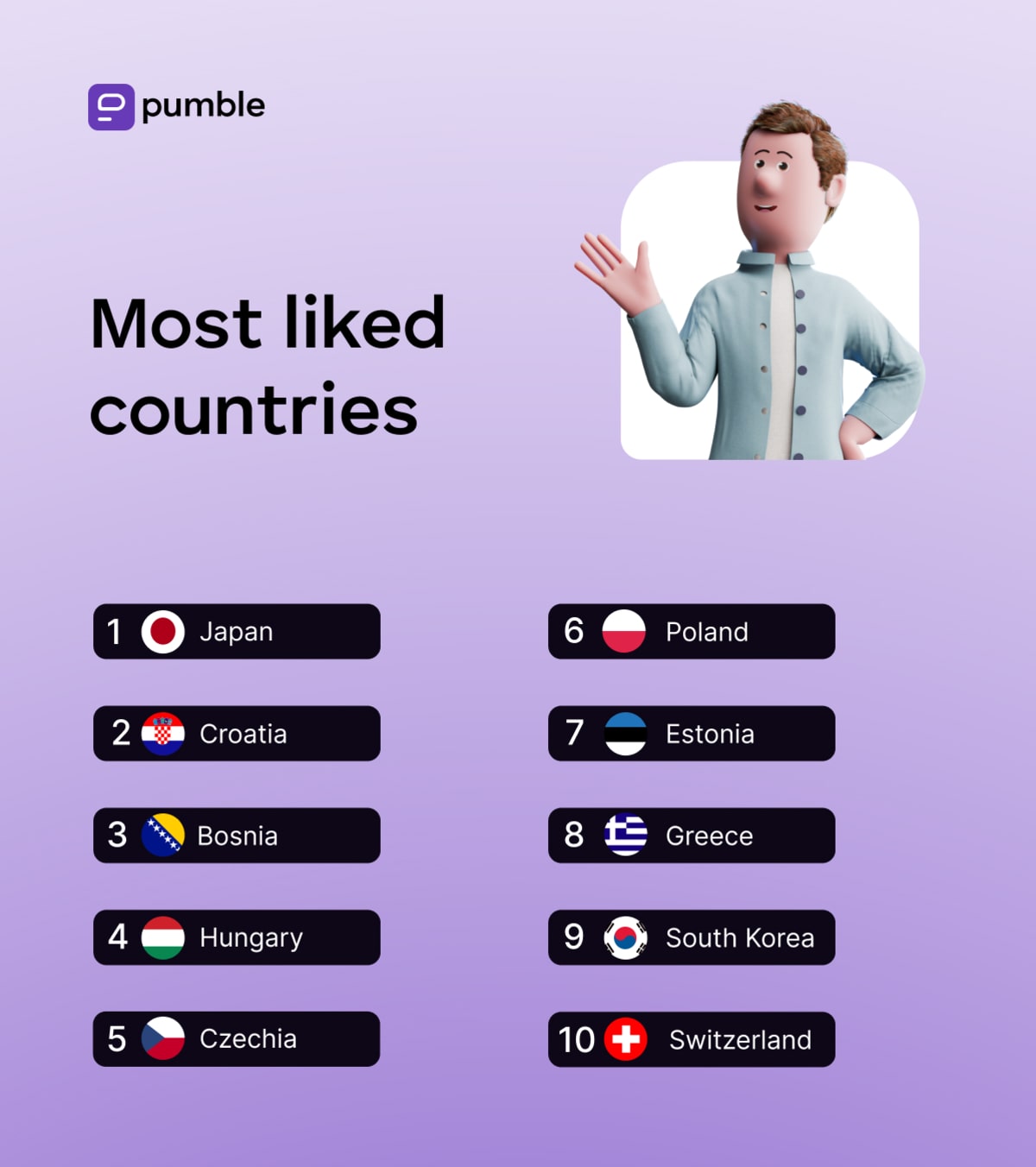
But, why do digital nomads like Croatia so much? Let’s take a look at all the benefits it has to offer.
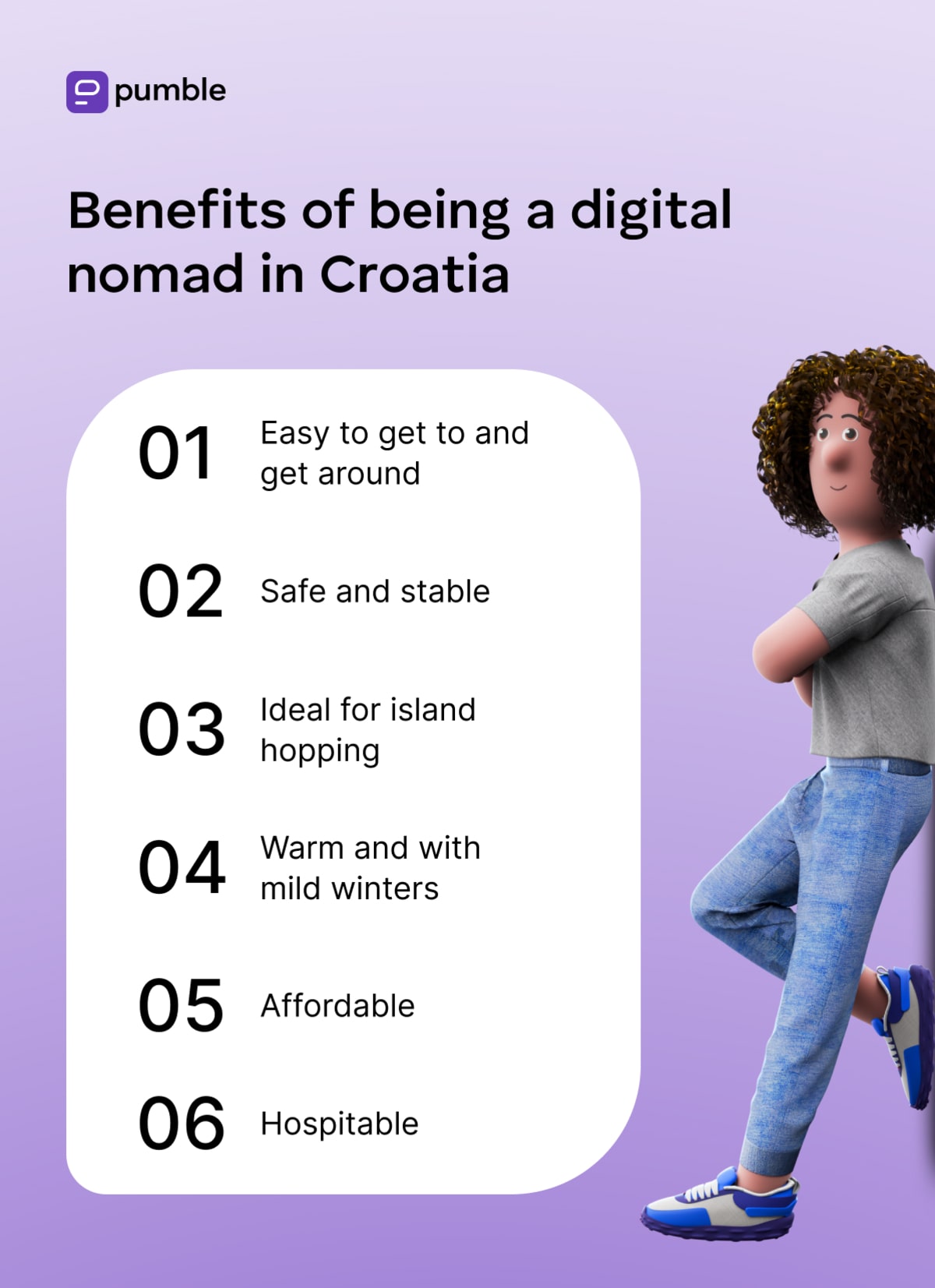
Benefit #1: Easy to get to and get around
One of the major benefits of Croatia is its location. It serves as a link between Western Europe and the Balkans, thus providing digital nomads who come to visit the best of both worlds. They can hop pretty much anywhere they want for a day or 2 or even for an extended weekend.
Croatia has 9 international airports, and all the biggest tourist (and digital nomad) destinations have one. That means it’s easy for nomads to find their way to Croatia and their chosen micro-location (no matter what it may be).
However, keep in mind that just because a town has an airport doesn’t mean you’ll be able to hop on a flight to anywhere, as Ivanikova noted.

“Although I adore Split, it’s kind of hard to travel abroad from it. It has its own airport but there are almost no direct flights departing from Split, not even to EU destinations. Instead, I have to either take a connection flight to Zagreb or get to Zagreb via a bus and then fly from there.”
While not all airports offer international flights, they are all well-connected to the capital, Zagreb, which makes Croatia easy to get to and use as a traveling base.
Benefit #2: Safe and stable
Croatia is, overall, quite a safe country. It ranked 19th on the Global Peace Index, besting Germany, Spain, and Italy.
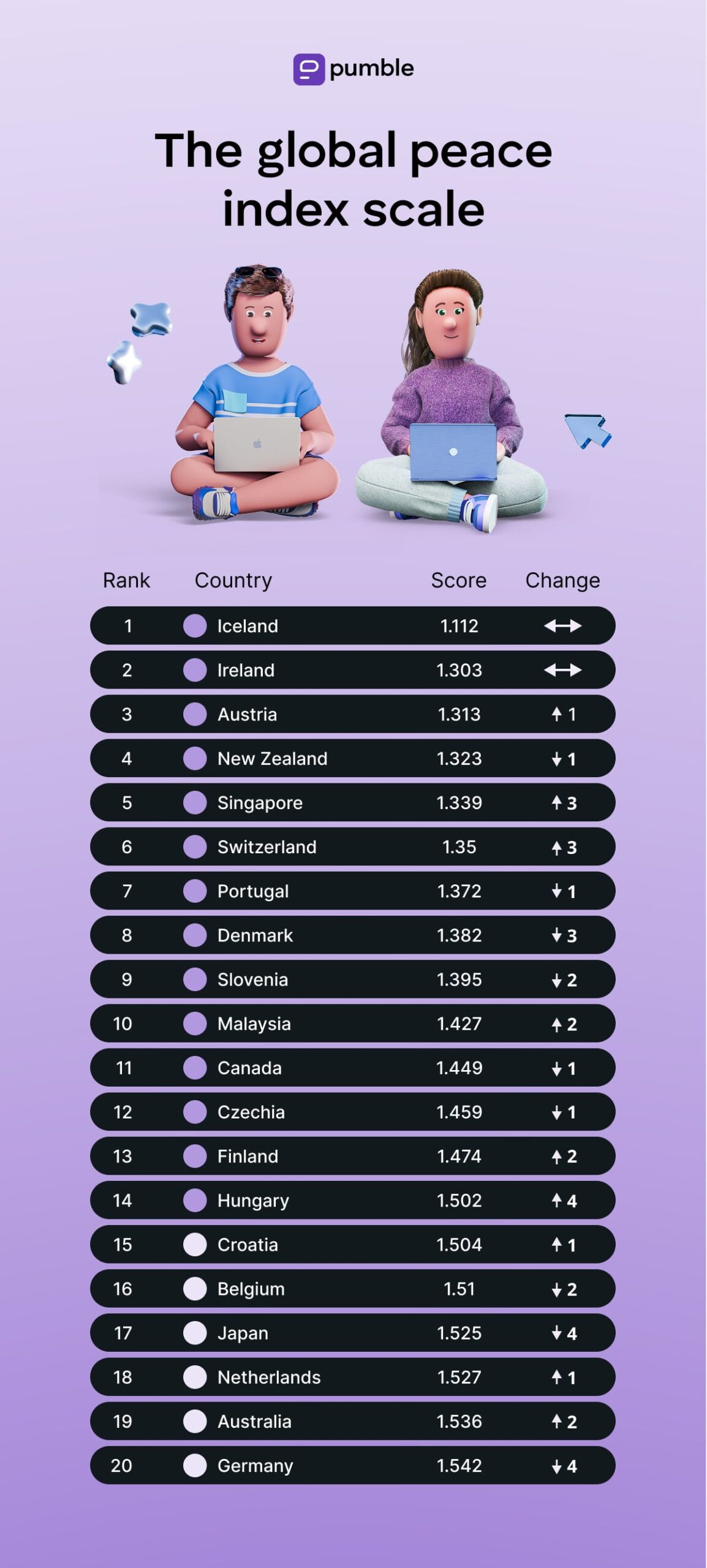
Safety and stability are among the vital factors for digital nomads. Unfriendly locals, social unrest, and political turbulence aren’t something that is particularly alluring to digital nomads.
Thankfully, Croatia is anything but. A member of both the EU and NATO, Croatia is stable and protected. Although it does leave something to be desired when it comes to the safety of minorities, Croatia is an overall safe country.
Our trusted expert Andrea Woods confirms this:

“In our experience over the past 2 years, Croatia is an extremely safe country. We have never felt threatened or insecure in Croatia, which isn’t something I can say for a lot of the countries I visited. I’d say that, overall, Croatia is also a good destination for solo travelers and female digital nomads.”
Ivanikova agrees with her and testifies of her own positive experiences as a female traveler:

“I am a solo traveler and I live and travel all over Croatia alone. This is one of the safest countries I’ve ever been to. I never had any issues or troubles and I’ve never felt unsafe — not even when I was getting back home alone at night.”
So, the safety levels for digital nomads (especially women) seem to be satisfactory.
Unfortunately, POC and LGBTQ+ minorities don’t enjoy the same privileges as the rest of the people in Croatia, as indicated by the Equaldex index of LGBTQ rights.
Benefit #3: Ideal for island hopping
Who can resist a bit of island life, are we right?
Croatia is known as the land of 1,000 islands (1244, to be precise). Of course, not all of them are inhabitable or even fit for a visit, but the scattered Croatian coast looks beautiful, so at least all of them are gorgeous to look at.
Aside from island hopping, you can also enjoy the Croatian riviera from the main coast. Each coastal town has its own riva or the seaside promenade that you can strut down in the evenings after you spend the sunny, warm days on one of the country’s 93 Blue Flag beaches.
Benefit #4: Warm and with mild winters (usually)
Croatia technically has 2 different climates:
- The Mediterranean climate on the coast, and
- The continental climate inland.
Both have their advantages and disadvantages, although the mild Mediterranean climate is what most people visit Croatia for.
Warm summers and cold winters are typical for the continental parts of Croatia. If you like to experience all 4 seasons during the year, Zagreb or another inland city are the ideal places for you.
However, if you prefer to have more than 200 sunny days, you should consider spending them on the coast. If you like to be active while nomading, you can spend your days hiking through Croatia’s rugged coastal topography.
Many people pick Croatia as both a summer and winter destination because of its climate. In fact, Wood and her husband were first drawn to Croatia because of the mild weather.

“When we first visited Croatia in 2020, we didn’t know much about it. However, we fell in love in the meantime and kept coming back. The mild climate and the exquisite nature are definitely things that set Croatia apart from other countries. Alongside great wifi and an amazingly laid-back lifestyle, I’d say the climate might be the best thing Croatia has to offer to digital nomads. It’s perfect for outdoor activities and adventures.”
Benefit #5: Affordable
Overall, Croatia has a lower cost of living than quite a few countries of Western Europe.
For example, Croatia has 59% lower costs of housing than the EU average, while restaurants and hotels are 21.3% cheaper than in the EU (on average).
Food prices are 5.2% lower than the EU average, and transportation services are 12% lower.
Overall, you’ll buy more for less in Croatia than you would in most other EU countries.
However, the exact costs vary depending on where in Croatia you are and the time of the year. As mentioned, the high season sees an increase in prices of pretty much everything across the country.
However, comparatively, even during high season, Croatia is still an affordable country.
Benefit #6: Hospitable
Croatians are typically quite friendly and helpful. They love to joke around and have a laidback lifestyle that they cherish.
Their relaxed approach to life isn’t surprising, given that they rank 40th on the latest Global Prosperity Index from 2023.
You’ll often find a typical local drinking coffee for a couple of hours and chatting the day away. Luckily, you’ll just as often hear them inviting you to join in on their daily ritual.
A relaxed lifestyle and a positive approach to foreigners is something you’ll mostly find in all major Croatian cities.
As a country that heavily relies on tourism, Croatia has a very high English proficiency ranking. They are currently the 5th country in the world when it comes to proficiency in English.
Their readiness to talk to you in English (or even attempt to chat in a number of other languages) definitely contributes to the overall feeling of acceptance that digital nomads and tourists tend to experience in Croatia.
What are the drawbacks of being a digital nomad in Croatia?
It’s clear that Croatia has quite a lot to offer to digital nomads. But, does that make it perfect?
No, of course not.
So, let’s take a look at some of the drawbacks that might make some digital nomads think twice before immediately booking that ticket to Croatia.

Drawback #1: Bureaucracy
Bureaucracy is something that all digital nomads struggle with in Croatia. Namely, a lot of so-called “gray areas” in the law lead to various interpretations and allow police stations and police officials to make individual decisions.
You’ll often hear digital nomads exchanging tips and tricks on how to jump through various hoops of the Croatian bureaucracy as painlessly as possible.
It’s safe to say that Croatia would definitely benefit from a more consistent system.
What’s more, although gathering the necessary documentation might not seem like a huge task at first glance, it often ends up being difficult due to specific stipulations.
All documents have to have an apostille and can’t be older than 6 (or sometimes even 3) months. Considering that a lot of digital nomads arrive in Croatia from a third country (and not their country of origin), getting those documents in time to Croatia is challenging.
Another difficult aspect of the Croatian bureaucracy is the fact that it’s quick to change. Rules and regulations change fast and if you want to be in accordance with the law, you better adapt quickly!
Drawback #2: Difficult language
According to the Foreign Language Training Institute, Croatian falls into the “Hard languages” category because it’s so difficult for English speakers to pick up.
On average, it takes around 44 weeks for an English speaker to wrestle their way through all the rules of the Croatian language.
Living in a country with a native language so foreign to their own (be it English or any other one) can prove quite difficult for digital nomads.
Although Croatian people have an admirable rank when it comes to English proficiency, the fact that the native language is so difficult to learn and understand can prove to be a hurdle. That’s especially true when you’re dealing with officials of any kind (like, say, when you’re trying to apply for a digital nomad residency permit).
Drawback #3: Crowded in spring and summer
According to the Croatian Ministry of Sport and Tourism, 2023 saw 20.6 million travellers who made 108 million overnight stays in Croatia.
As you can imagine, most of those stays happened during spring and summer. So, if you don’t like crowds, either avoid the high season altogether or at least don’t travel to tourist hubs during it.
The fact that the high and low seasons are so different poses several different issues (crowds being just one of them). Ivanikova offered another insight regarding this.

“During the summer, the coast is really overcrowded, but during the winter, it’s almost dead. Split is a bit different from other coastal cities because it stays somewhat lively during winter. Although the contrast is significant between high and low seasons, most of the bars, restaurants, and stores stay open, while in Dubrovnik, for example, half are closed already by November.”
5 Best destinations for digital nomads in Croatia
Now that you know the ins and outs of getting the Croatia digital nomad visa and all the reasons to start packing your bags immediately, it’s time to see which spots are fan-favorites among digital nomads.
As mentioned, Croatia is a country that only seems small. With over 1,000 islands, Croatia has plenty of nooks and crannies you can explore. But not every island is fit to be a digital nomad hub, no matter how devastatingly beautiful.
So, let’s see which destinations rank as best for digital nomads like you!
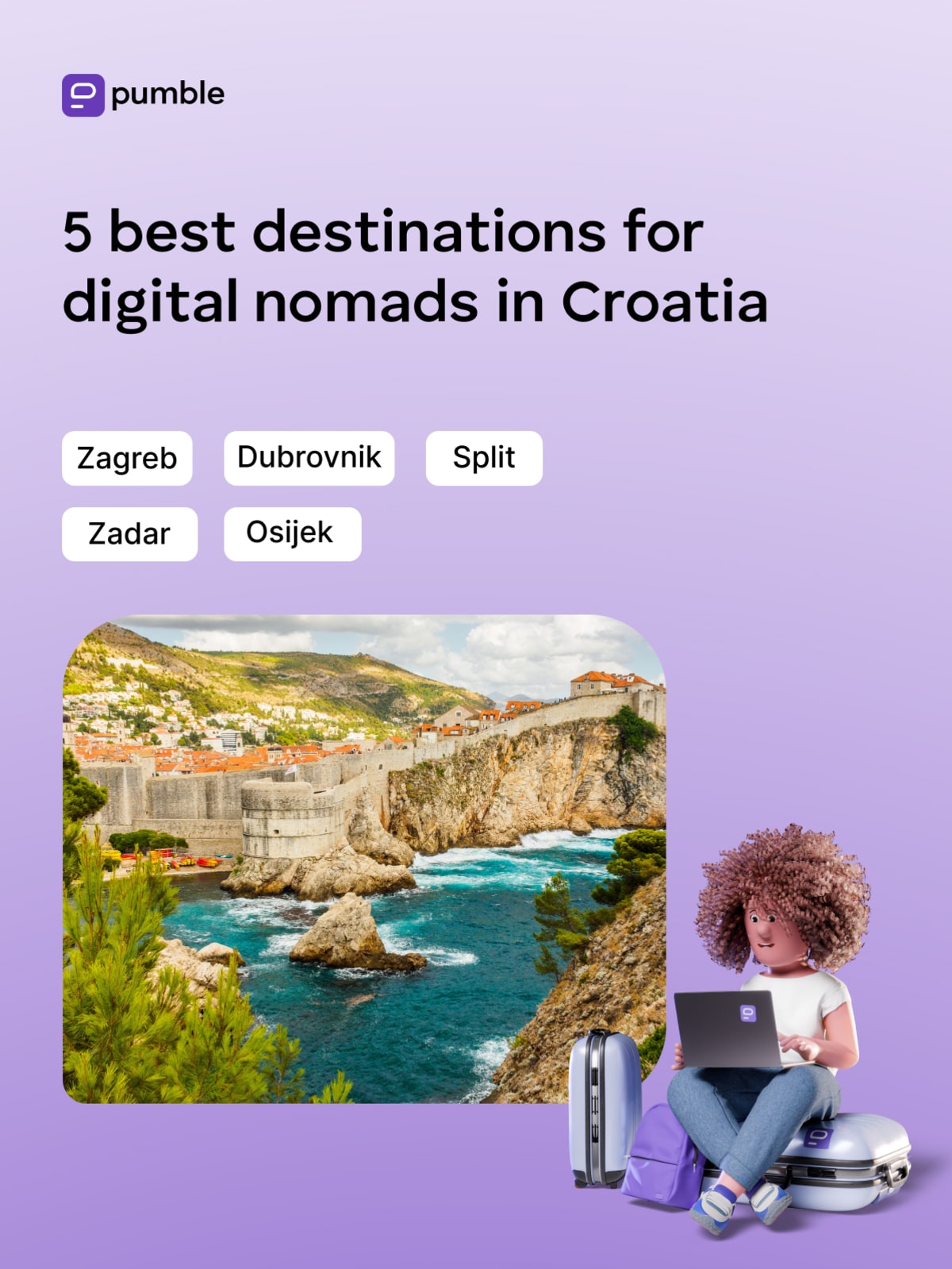
Zagreb — Best for solo nomads looking for a community
Population: 806,341
City area: 247mi² (641 km2)
Time zone: GMT+1
Average internet speed: 105.73 Mbps (median download speed); 50.28 Mbps (median upload speed)
Average cost of living: €2,536.1 (~$2,886) per month for a family of 4; €732.3 (~$833.25) per month for a single person (without rent)
Average rent: €600–€800 (~$682.71–$910.28) per month for a 1-bedroom apartment in the city center
Biggest advantage: A huge expat and digital nomad community
Biggest drawback: Colder than it is on the coast
The capital of Croatia, Zagreb, is the biggest city in the country. It is also one of the most developed. The infrastructure is amazing, and there are plenty of amenities, especially in the city’s historic center (Donji Grad).
Zagreb isn’t a coastal town, and it doesn’t have that signature Mediterranean climate. On the other hand, it also doesn’t have fluctuating prices.
It’s strategically located and has an international airport, which makes it a great connection to the rest of Europe — something digital nomads greatly appreciate. Other popular European destinations are just a plane ride away from Zagreb.
What’s more, its already impressively well-developed infrastructure is constantly being improved — Zagreb is soon to get a direct train line from the city center to the airport, which will make traveling from and to Zagreb even easier for digital nomads.
There’s something to do year-round in Zagreb, like:
- Take a historical tour of the city,
- Visit the Nikola Tesla Technical Museum,
- Go on funicular rides,
- Do a bike city tour,
- Hike up the Medvednica mountain,
- Hit up the frequent digital nomad get-togethers, etc.
With plenty to do and people to do it with (thanks to Zagreb’s massive digital nomad community), you’ll never be bored in Zagreb!
Where to work in Zagreb
Since it’s the capital, Zagreb has plenty of coworking spaces, but the best one is WESPA Spaces | Office, Coworking & Event Space. It has a 4.8 star ranking on Google, made by 273 voters.
Dubrovnik — Best for those with a bigger budget
Population: 42,615
City area: 8.25mi² (21.35 km2)
Time zone: GMT+1
Average internet speed: 40.89 Mbps (median download speed); 26 Mbps (median upload speed)
Average cost of living: €2,748.95 (~$3,128.43) per month for a family of 4; €782.92 (~$891) per month for a single person (without rent)
Average rent: €530.41–€862 (~$603.64–$981.01) per month for a 1-bedroom apartment in the city center
Biggest advantage: Popular, especially with the younger crowd
Biggest drawback: Expensive
Potentially one of the most famous places in all of Croatia, Dubrovnik was a hot destination even before Game of Thrones decided to turn it into King’s Landing.
A not-so-hidden gem of the Croatian coast, this UNESCO World Heritage Site is full of gorgeous wonders of architecture.
However, as beautiful as it is to marvel at, some might have to do it from afar.
Dubrovnik is one of the most (if not the most) expensive places in all of Croatia. Of course, if you’ll remember what our expert told us, that only gets worse in the summer.
So, if you’ve got your heart set out for going to Dubrovnik during the high season, prepare a hefty budget.
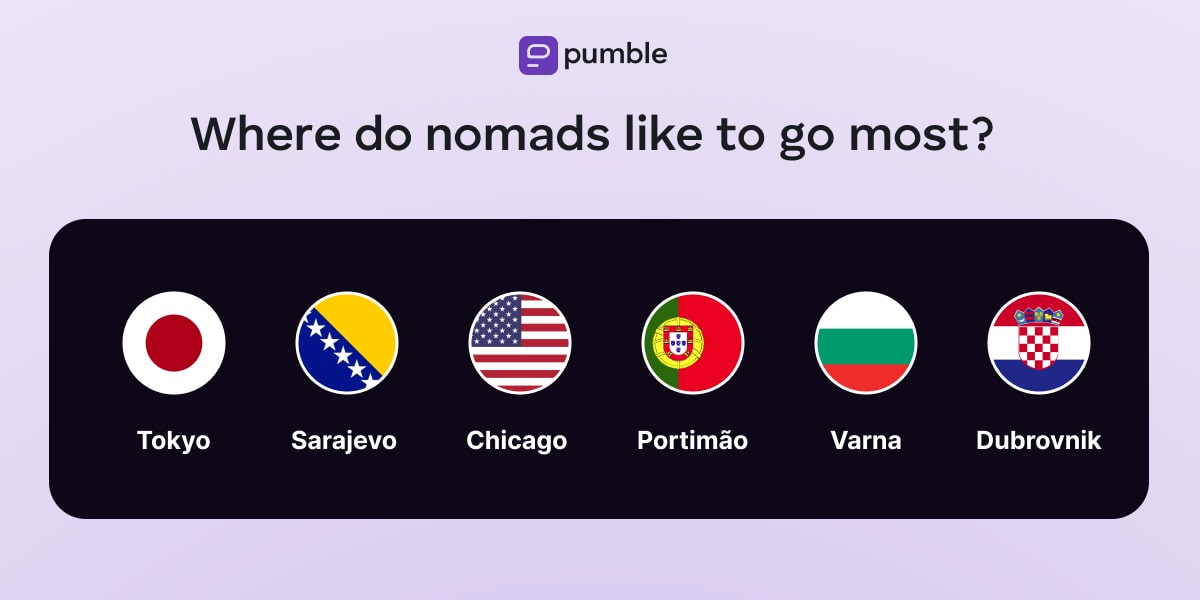
Where to work in Dubrovnik
Since it’s such a small coastal town, Dubrovnik doesn’t have many coworking spaces. The few that can be found are almost always overbooked. However, you can always work from coffee shops and restaurants (yes, even the Michelin-star ones). Since Dubrovnik gets visited by up to 1.5 million people every year according to the latest data, the locals are quite accustomed to foreigners and will welcome you with open arms (and steep bills).
Try Pumble, the best communication app for remote workers
Split — Best for those who love historic architecture
Population: 161,312
City area: 30.65mi² (79.38 km2)
Time zone: GMT+1
Average internet speed: 87.86 Mbps (median download speed); 8.87 Mbps (median upload speed)
Average cost of living: €2,622.3 (~$2,984.33) per month for a family of 4; €737 (~$838.67) per month for a single person (without rent)
Average rent: €500–€1,000 (~$569–$1,137.99) per month for a 1-bedroom apartment in the city center
Biggest advantage: Excellent cuisine and gastronomic scene
Biggest drawback: Expensive during the high season
The biggest city on the coast, Split is well-connected both to the rest of Croatia and, thanks to its international airport, to the rest of Europe.
A town known for its devotion and adoration of food, Split has some of the best restaurants in Croatia.
The old town is full of historic buildings you’ll enjoy touring, as well as cafes and bars in which you’ll easily be able to work.
Thanks to its large community of expats and digital nomads, as well as availability of housing, Split might be the place to be.
Ivanikova agrees, stating that Split is also particularly alluring to everyone who loves nature.

“Split is surrounded by mountains with a lot of hiking trails of different complexity. It is a paradise for those who love hiking (and mountain climbing as well). Croatia in general has gorgeous nature and there are so many national parks that you start to think that the entire country is one massive national park. The sea is also cristal clear and perfectly blue — perfect for a swim anytime from May to October.”
Of course, it’s not all perfect in the charming town of Split. During the high season, the prices will leave you shocked.
Where to work in Split
Since it’s so popular with the younger crowd (and nomads), Split has quite a few coworking spaces. The best rated one is The Works Coworking, with 4.9 stars based on 149 reviews.
Zadar — Best for outdoor activities
Population: 75,082
City area: 9.7mi² (25 km2)
Time zone: GMT+1
Average internet speed: 51.5 Mbps (median download speed); 14.7 Mbps (median upload speed)
Average cost of living: €2,746.79 (~$3,125.85) per month for a family of 4; €785.04 (~$893.34) per month for a single person (without rent)
Average rent: €400–€700 (~$455.18–$796.57) per month for a 1-bedroom apartment in the city center
Biggest advantage: Surrounded by national parks
Biggest drawback: Gets quite cold in the winter
If you’re looking for a smaller town that still offers plenty of activities, Zadar is the ideal place for you. Located 2 hours north of Split, Zadar still has a great location while being a bit away from the main tourist routes.
Quiet, ideal for sightseeing on foot, and surrounded by greenery, Zadar is the ideal destination for digital nomads who like to spend their time in nature. Two national parks, Kornati and Plitvice are quite close, and the hiking tours that are available to those who reside in Zadar are practically life-changing.
There’s also a digital nomad village in Zadar and, although small, the digital nomad community in Zadar is supportive and evergrowing.
Where to work in Zadar
Out of all the coworking spaces in Zadar, the COIN Coworking Zadar has the highest ranking — 90 people ranked this space with 4.8 stars.
Stay connected with your team — Try Pumble
Osijek — Best for those who want to go off the beaten path
Population: 96,848
City area: 67.50mi² (169 km2)
Time zone: GMT+1
Average internet speed: 36.52 Mbps (median download speed); 13.73 Mbps (median upload speed)
Average cost of living: €2,335.8 (~$2,658.06) per month for a family of 4; €671.1 (~$763.69) per month for a single person (without rent)
Average rent: €350–€500 (~$398.29–$569) per month for a 1-bedroom apartment in the city center
Biggest advantage: Affordable
Biggest drawback: Not a lot of nomads and expats
The capital of Slavonia, Osijek, isn’t a town that will be on any tourists list of must-visits.
However, we really think it should be.
Aside from being not only charming but also rich in history, Osijek is quite affordable.
That makes it perfect for those traveling and nomading on a budget. Compared to Zagreb, Osijek has 35.5% lower prices of rent and 13.8% lower prices of groceries.
An average digital nomad who earns at least €3,295 (or ~$3,760.4) per month (as per the requirements of the visa) could live quite comfortably in Osijek.
Where to work in Osijek
Although there aren’t that many coworking spaces in Osijek, the city offers plenty of cafes and bars with friendly staff who will let you plug your laptop into their outlets and work your day away. And, given how friendly everyone there is, they’ll probably agree to practice Croatian phrases with you.
Tips for digital nomads in Croatia
Digital nomads in Croatia sometimes have to find their own way through layers of muddy, never clear enough to be understandable bureaucracy. To make things easier and to give you more insights into what living in Croatia is like, we prepared some additional tips for you!
Tip #1: Submit your documents in Croatian
If you take a close look at the requirements for the visa, you’ll see it clearly says on the page: “Copies of documents should be submitted in the Croatian or English language.”
That “or” between ‘Croatian’ and ‘English’ is there just for show.
If you want to make things easier for yourself, submit the documents in Croatian (officially translated, of course).
Now, that doesn’t mean that an application in English will be automatically rejected. However, the whole process might be a bit quicker or even easier if the documents are in Croatian.
Tip #2: Go during the low season
We’ve already mentioned this, but it does bear repeating. Try to avoid the high season (spring and summer).
Instead, visit Croatia (or at least time your arrival) between October and April.
You’ll encounter fewer tourists and you’ll probably pay less for everything (accommodation and food included).
Tip #3: Croatians are still adjusting to the euro, so check your change
As of January 1st, 2023, Croatia officially became the 20th member of the Euro Area and switched from the Croatian kuna to the euro.
Even before the switch, Croatians accepted euros in quite a few establishments and were used to dealing with that currency. However, the complete switch to the euro still took some of them by surprise.
A lot of people are struggling to adjust to the change. So, if you plan on visiting Croatia any time soon, make sure to count your change when you get it.
🎓 Pumble Pro Tip
If Croatia still hasn’t come up on your list of places to nomad through, check out some other amazing countries that offer digital nomad visas — like Spain, Portugal, Germany, and Thailand — and check out our full guides on digital nomad visa protocols in them:
Further reading for digital nomads in Croatia
Overall, this guide should give you a (more than) clear idea of what it takes to be a digital nomad in Croatia. We did our best to cover everything you might need to know — from the standard requirements to savvy tips we picked up from other nomads in Croatia.
However, one guide simply can’t cover every little detail. That’s why we prepared a list of additional sources where you can find more information about digital nomading in Croatia.
- If you’re looking for a community of digital nomads in Croatia, as well as some help, check out DNACroatia. This NGO was founded by no other than Jan de Jong, the Dutch entrepreneur who sparked the idea of a Croatia digital nomad visa in the first place.
- You can also take a peek at Expat In Croatia, a digital community of (if you’d believe it) expats in Croatia, that might give you a hand or advice on how to fit in.
- Although some might deem it outdated, Facebook will probably be one of your main tools when it comes to figuring out your way around Croatia. Groups like Digital Nomads Croatia and Digital Nomads Split Croatia are full of members who have gone through the process you’re planning on going through, and who know all the tips and tricks that will help you come out the other end with your sanity intact.
Enjoy your 1,000-island workation in Croatia with Pumble
Traveling and working at the same time often proves itself as a huge challenge. With so many things to consider and prepare, workations for digital nomads are certainly not a walk in the park — but they are definitely worth it in the long run.
Luckily, keeping up with your business and ensuring you’re productive when on the go is easier than ever, thanks to Pumble.
Pumble is a team communication app with many features designed to enhance your team’s connectivity and productivity, the most important ones being:
- Direct messaging for one-on-one conversations,
- Video conferencing for virtual meetings, and
- Channels and groups for topic-oriented discussions,
- File sharing for smooth and time-efficient collaborative work.
With Pumble, you can rest easy knowing that your communication will remain uninterrupted and your team will be all caught up — even while you’re frolicking through Croatia.
You don’t have to split your focus between working and exploring Croatia — with Pumble, you can do both. So try it out for free today!
Croatia digital nomads visa guide disclaimer
We hope this Croatia digital nomad visa guide has been helpful and that you enjoyed reading it. Throughout the guide, we have given you various links that might lead you to new interesting data or simply to articles that will expand your knowledge on various Croatia-related topics.
Please bear in mind that our article has been written in Q2 of 2025, so any changes made in the Croatia digital nomad visa procedures or laws after that time have not been included.
Before you start the application process, we advise you to consult with certified representatives, lawyers, and institutions that can provide you with all the information needed.
Pumble is not responsible for any negative responses, losses, or risks incurred, should this guide be used without further guidance from legal and other official advisors.
How we reviewed this post: Our writers & editors monitor the posts and update them when new information becomes available, to keep them fresh and relevant.





